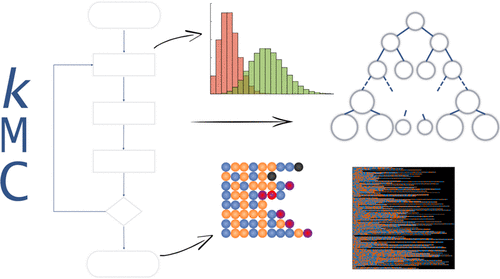当前位置:
X-MOL 学术
›
Ind. Eng. Chem. Res.
›
论文详情
Our official English website, www.x-mol.net, welcomes your
feedback! (Note: you will need to create a separate account there.)
Gillespie-Driven kinetic Monte Carlo Algorithms to Model Events for Bulk or Solution (Bio)Chemical Systems Containing Elemental and Distributed Species
Industrial & Engineering Chemistry Research ( IF 3.8 ) Pub Date : 2020-09-24 , DOI: 10.1021/acs.iecr.0c03888 Alessandro D. Trigilio 1 , Yoshi W. Marien 1 , Paul H. M. Van Steenberge 1 , Dagmar R. D’hooge 1, 2
Industrial & Engineering Chemistry Research ( IF 3.8 ) Pub Date : 2020-09-24 , DOI: 10.1021/acs.iecr.0c03888 Alessandro D. Trigilio 1 , Yoshi W. Marien 1 , Paul H. M. Van Steenberge 1 , Dagmar R. D’hooge 1, 2
Affiliation

|
Stochastic modeling techniques have emerged as a powerful tool to study the time evolution of processes in many research fields including (bio)chemical engineering and biology. One of the most applied techniques is kinetic Monte Carlo (kMC) modeling according to the stochastic simulation algorithm (SSA) as pioneered by Gillespie, in which MC channels and time steps are discretely sampled from probability distributions. In the last decades, the SSA algorithm, as originally developed for systems with elemental species (e.g., A, B, C, etc.), has been further adapted (i) to also tackle systems with distributed species, therefore, populations and (ii) to enable faster algorithm execution. In the present contribution, we highlight the most important developments, taking bulk/solution polymerization as the reference distributed chemical process. We address SSA principles based on conventional array data structures, common acceleration methods (e.g., τ leaping and the scaling method), and the strength of tree- and matrix-based data structures for detailed storage of molecular information per distribution type and even individual population member. In addition, we report advancement regarding array programming and MC sampling methods complemented by the introduction of the use of higher-order trees and root-finding sampling tools. The contribution gives thus a detailed overview of the available main kMC algorithm steps to study kinetics, irrespective of the specific field of application due to their generic nature.
中文翻译:

Gillespie驱动的动力学蒙特卡洛算法来建模包含元素和分布式物种的散装或溶液(生物)化学系统的事件
随机建模技术已成为研究(生物)化学工程和生物学等许多研究领域中过程时间演化的强大工具。最先进的技术之一是根据由吉莱斯皮(Gillespie)倡导的随机模拟算法(SSA)进行的动力学蒙特卡洛(kMC)建模,其中从概率分布中离散采样了MC通道和时间步长。在过去的几十年中,最初为具有元素物种(例如,A,B,C等)的系统开发的SSA算法已进行了进一步的修改(i),以解决具有分布物种的系统,因此解决了种群和( ii)加快算法执行速度。在当前的贡献中,我们重点介绍了最重要的进展,将本体/溶液聚合作为参考分布式化学过程。我们基于传统的数组数据结构,常见的加速方法(例如τ跃迁和缩放方法)以及基于树和矩阵的数据结构的强度来解决SSA原理,从而可以详细存储每个分布类型甚至单个种群的分子信息会员。此外,我们报告了有关数组编程和MC采样方法的进步,并辅之以使用高阶树和查找根的采样工具的使用。因此,由于它们的通用性质,因此不管具体的应用领域如何,该贡献将详细介绍可用的主要kMC算法步骤来研究动力学。以及基于树和矩阵的数据结构的强度,可用于按分布类型甚至单个种群成员详细存储分子信息。此外,我们报告了有关数组编程和MC采样方法的进步,并辅之以使用高阶树和查找根的采样工具的使用。因此,由于它们的通用性质,因此不管具体的应用领域如何,该贡献将详细介绍可用的主要kMC算法步骤来研究动力学。以及基于树和矩阵的数据结构的强度,可用于按分布类型甚至单个种群成员详细存储分子信息。此外,我们报告了有关数组编程和MC采样方法的进步,并辅之以使用高阶树和查找根的采样工具的使用。因此,由于它们的通用性质,因此不管具体的应用领域如何,该贡献将详细介绍可用的主要kMC算法步骤来研究动力学。
更新日期:2020-10-15
中文翻译:

Gillespie驱动的动力学蒙特卡洛算法来建模包含元素和分布式物种的散装或溶液(生物)化学系统的事件
随机建模技术已成为研究(生物)化学工程和生物学等许多研究领域中过程时间演化的强大工具。最先进的技术之一是根据由吉莱斯皮(Gillespie)倡导的随机模拟算法(SSA)进行的动力学蒙特卡洛(kMC)建模,其中从概率分布中离散采样了MC通道和时间步长。在过去的几十年中,最初为具有元素物种(例如,A,B,C等)的系统开发的SSA算法已进行了进一步的修改(i),以解决具有分布物种的系统,因此解决了种群和( ii)加快算法执行速度。在当前的贡献中,我们重点介绍了最重要的进展,将本体/溶液聚合作为参考分布式化学过程。我们基于传统的数组数据结构,常见的加速方法(例如τ跃迁和缩放方法)以及基于树和矩阵的数据结构的强度来解决SSA原理,从而可以详细存储每个分布类型甚至单个种群的分子信息会员。此外,我们报告了有关数组编程和MC采样方法的进步,并辅之以使用高阶树和查找根的采样工具的使用。因此,由于它们的通用性质,因此不管具体的应用领域如何,该贡献将详细介绍可用的主要kMC算法步骤来研究动力学。以及基于树和矩阵的数据结构的强度,可用于按分布类型甚至单个种群成员详细存储分子信息。此外,我们报告了有关数组编程和MC采样方法的进步,并辅之以使用高阶树和查找根的采样工具的使用。因此,由于它们的通用性质,因此不管具体的应用领域如何,该贡献将详细介绍可用的主要kMC算法步骤来研究动力学。以及基于树和矩阵的数据结构的强度,可用于按分布类型甚至单个种群成员详细存储分子信息。此外,我们报告了有关数组编程和MC采样方法的进步,并辅之以使用高阶树和查找根的采样工具的使用。因此,由于它们的通用性质,因此不管具体的应用领域如何,该贡献将详细介绍可用的主要kMC算法步骤来研究动力学。











































 京公网安备 11010802027423号
京公网安备 11010802027423号